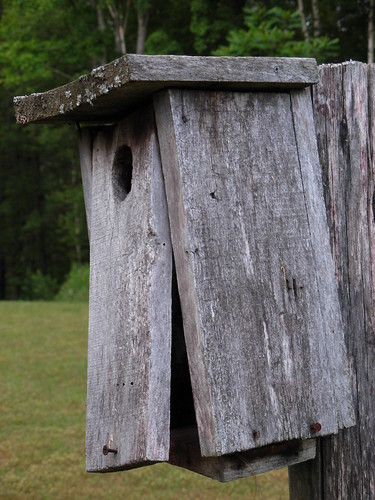Some years ago our good friends Brian and Leslie were
house-hunting on Bainbridge Island.
In spite of having told the real estate grabber (got
that from The Charming Prince) that they wanted
something with character, that they preferred funky
over precious, they spent an exhausting day looking at
builder burgers and assorted McMansions. (TCP is
responsible for builer burgers, too.)
B&L were ready to give up, when the frustrated and
confused saleswoman said, "I might as well show you one
more. It’s a long shot, but we’re in the neighborhood."
That last house sat on the beach at the foot of a
great, rickety wooden staircase. It was old. It was
simple. And it had character oozing out of every pore.
B&L made an offer on the spot.
Are You Hiding Your Most Important Asset?
That beach house was perfect for B&L, not because of
its perfection in the eyes of the real estate pros, but
because its imperfections suited them to a tee. The same thing is true in your business. And I do mean
that for you, specifically. I’ve never had a client who
wasn’t hiding a critical asset because they feared it
was a weakness.
Jacqueline and Joseph Freeman were embarrassed about
the size of their school until Jacqueline got to page
22 of The Way of the Accidental Entrepreneur.
Here’s what she wrote me about how their weakness
became an asset in a matter of moments:
So I’m partway through reading the book, up to page 22
(the story of Maggie and Anne), and when I got to the
question about what I’m hiding, I had to stop.I’ve been working with since August on internet
marketing and all of a sudden I realized I’d been
tippytoeing around the fact that our school is SMALL.I keep trying to run against the pack of big schools
and somehow online make us seem like a bigGER
school when really my hook here is that we are so
small that every single student is a real person and
gets plenty of individual attention.Who wouldn’t want THAT?
How to Uncover Your Hidden Asset
You may be thinking that your situation is different. But is it really?
Try this experiment. Complete the following sentence:
"I’d rather my clients not know that…"
I’m virtually certain that what you write is an asset in disguise.
Is Everything Embarrassing an Asset?
Does this mean that all you have to do to get lots of business is to trot out your most embarrassing characteristics?
No. No. No.
Your alleged weakness has to be relevant to your just-right clients. And to learn if and how it is, you’d be wise to talk to people, the kind of people you’d like to work with.
You don’t need to take out an ad in The New York Times. Just meet over coffee and ask for feedback about what parts of your life experience and business are attractive.
That can be scary. I remember sitting down with a learned friend (the Ph.D. and multi-lingual kind) and talking about my lack of a college degree. I wanted his advice about whether or not to go back to school.
At the time I didn’t envision this man as a client, though, if I’d though about it, I would have recognized him as the kind of person I wanted to work with. And as it happens, he’s hired me more than once.
But I digress.
My friend looked at me and said, "Why on earth would you go back to school?"
"For legitimacy. For credibility," I said.
And he rolled his eyes.
I had two conversations like that before deciding that, while learning was at the top of my priority list, finishing college was not.
Simply put, my just-right clients value intelligence, but they’ve had enough of the academic, theoretical, refined sort. They want to hear how it works at street level.
And believe me, that’s what I know about.
Enough About Me. Let’s Talk About You
Perhaps you are convinced that your weaknesses may be the key to your unique appeal. But the question remains: How do you talk to folks about weaknesses without appearing needy, self-pitying, or like a failure?
The secret to that is to make the conversation about the other person. The topic is not, "What’s wrong with me and can you possibly stand it?" The topic is, "What’s important to you? And how can I serve that?"
Jacqueline has ample evidence that their students thrive because of their smallness. Smallness allows people to live and work in close proximity, to participate in the day-to-day lives of the horses they are learning to heal, and to see up close and personal one kind of business that is possible.
From that foundation, she can easily ask students, "What about the small size of this program really works for you?
Similarly, I can ask you, "What about my non-traditional –one might even say checkered–path to coaching really works for you?"
(Hey! That’s a good question. I’d love to hear your answers here.
The Bonus Room
I find it hard to believe, but these days houses come with "bonus rooms." What’s up with that?
Anyway, it’s as good a segue as any to another important moral of the tale of B&L. That is, if you don’t listen to your clients you are going to be frustrated and confused a lot of the time.
B&L are vivacious, articulate, fun people. Anyone who actually listened to what they wanted would have taken them to the beach house first, not last. And instead of regaling their guests with the story of a near-miss, they’d be singing the praises of a saleswoman who paid attention.
Yes. It really is that easy.
Acknowledgements
Thank you to Jacqueline for permission to quote her letter. Jacqueline Freeman,
Training Director
The Equine Natural Movement School
Bodywork that honors & respects the horse’s structure & spirit www.EquineNaturalMovement.com


